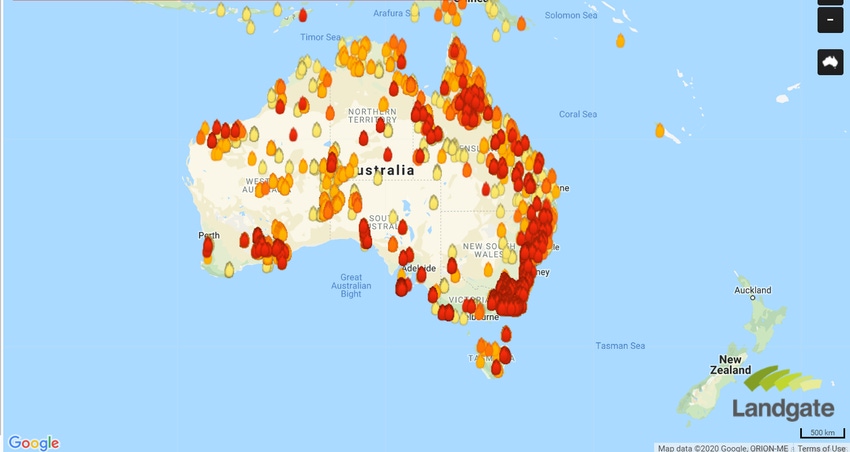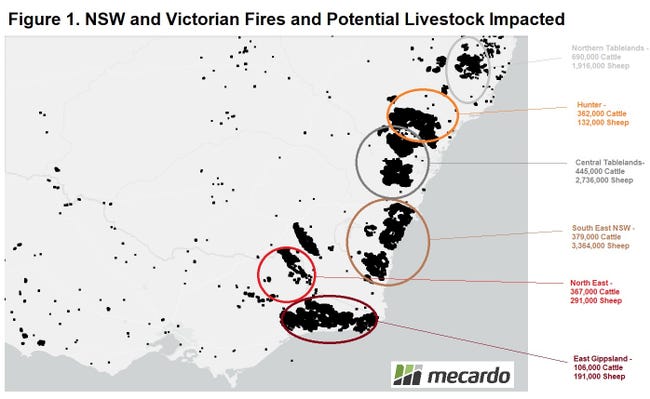Millions of sheep and cattle could be affected by wildfires ravaging southern Australia.

Livestock losses across South Australia are in the thousands, and the figure is growing due to smoke and heat as a bushfire crisis deepens, Australia’s Minister for Agriculture Bridget McKenzie said Friday. However, she urged regional communities to continue to prioritize personal safety, even as concern for livestock grows.
"The devastating loss of life to date underscores a critical need for cooperation and support in regional and urban communities alike,” McKenzie said. To date, the bushfires have resulted in at least 19 human fatalities, with dozens of others missing.
According to the New South Wales (NSW) Rural Fire Service, at midnight on Thursday, 137 fires were burning across NSW, with more than 60 yet to be contained.
“Over 2,000 firefighters are continuing to work hard throughout this evening in preparation for severe and extreme fire danger predicted for many parts of the state today,” the agency tweeted.
The Victorian government declared a state of emergency Jan. 2 as fires were expected to continue to ravage the region.
Mecardo agricultural analyst Matt Ballarat reported Jan. 3 that approximately 8.6 million head of sheep (12% of the flock) and 2.3 million head of cattle (9% of the herd) could be affected by the fires (Figure 1).
“Not all livestock in areas will be impacted but gives an idea of total numbers in these zones,” he said.

It is currently estimated that nearly 12.5 million acres of land have burned in Australia.
Property damage across the country is widespread, and the task of rebuilding lives, communities and economies will be long term, McKenzie noted.
She has been in contact with state agriculture ministers and state farming organizations to ensure that the agriculture sector’s needs are met. “That goes right through to the recovery phase, which is likely to be long and hard as people, livestock and properties continue to be affected by smoke, charred surrounds and lack of feed,” McKenzie said.
While the primary concern is for the well-being of people, she said there is also growing concern for the welfare of livestock in affected areas.
"The NSW Rural Fire Service has today asked farmers to assess the possibility of relocating livestock from affected areas. Agriculture Victoria vets are on the ground in bushfire zones ready to help farmers assess livestock right now, and that will continue,” she added.
McKenzie said animal welfare is the top priority, as is disposing of dead stock and containing the spread of disease as the country moves into the recovery phase.
Australian livestock producers use a National Livestock Identification System (NLIS) that requires movement of stock to be tracked, but McKenzie said getting animals to safety needs to be the focus.
"NLIS reporting can be undertaken when the animals are safely relocated. If in any doubt, contact the local department of primary industries in your state," she advised. "Regardless, relocating stock during a bushfire is an enormous logistical challenge that, in many cases, may simply not be possible.”
Further, McKenzie said feeding flocks and herds in country that is often isolated from supply chains is also a challenge. “This challenge, along with re-establishing infrastructure like fencing and safe water supplies, is likely to take months rather than weeks,” she added.
Realizing the serious nature of the situation, McKenzie has asked the agriculture department to cease any debt recovery action for levies, fees and charges for the moment to focus on immediate concerns.
“Our farmers and their communities are resilient, but they can’t do this alone. Recovery will be an exercise in national cooperation and compassion,” McKenzie said.
About the Author(s)
You May Also Like



.png?width=300&auto=webp&quality=80&disable=upscale)

